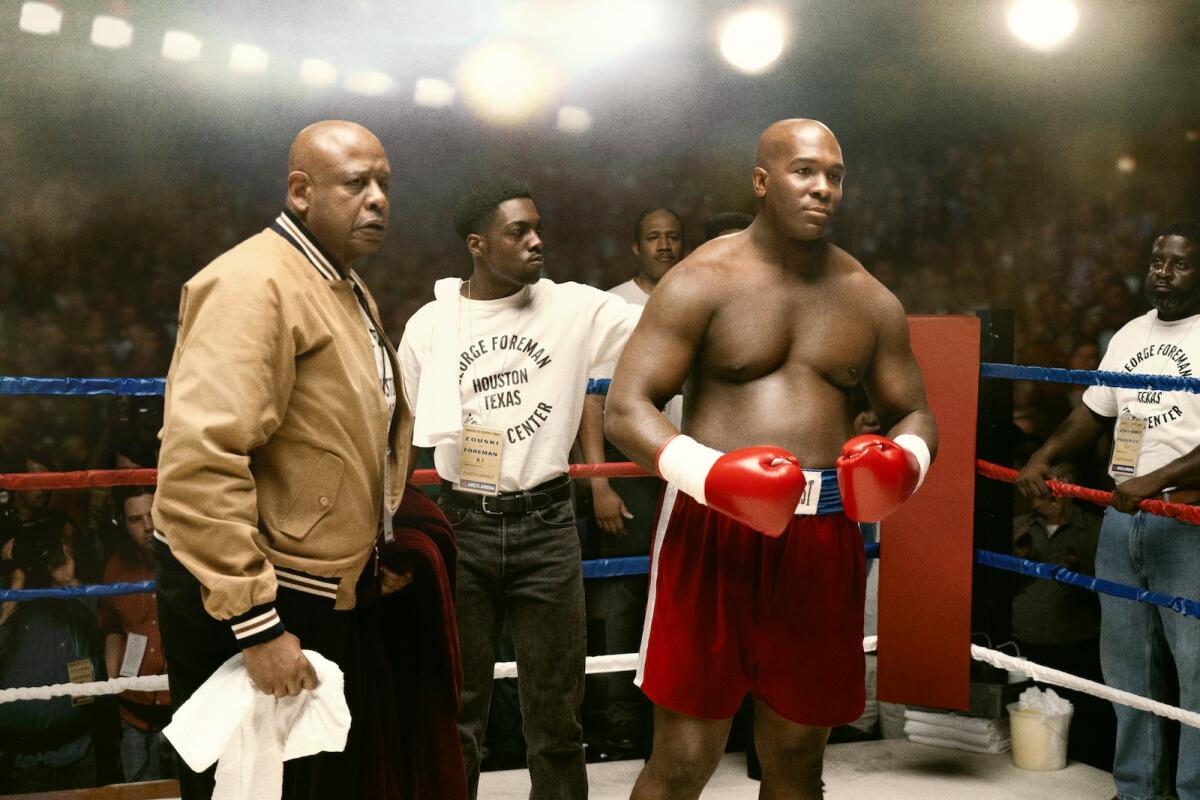‘Big George Foreman’ saddles the former champ with a squeaky clean, lightweight story

- Share via
For a certain millennial population, the name “George Foreman” is more likely to conjure up an image of a favorite kitchen appliance before it brings to mind “heavyweight champ.” Indeed, the boxer/preacher/entrepreneur might be better known these days for his “Lean Mean Fat-Reducing Grilling Machine,” a gadget renowned in college dorms and bachelor pads across the nation, thanks to Foreman’s affable infomercials and infectious grin. Foreman became a pop cultural icon in the ’90s with a ubiquitous media presence and likable quirks, such as his five sons all named George Foreman.
But in the new biopic directed and co-written by George Tillman Jr., with a title as large as its subject, “Big George Foreman: The Miraculous Story of the Once and Future Heavyweight Champion of the World,” the grill, and the sons, are relegated to the sidelines. This film seeks to reassert George’s story as an athlete and a born-again Christian, who relied on his faith to make a miraculous comeback and win the heavyweight title in 1994 at the age of 45, becoming the oldest man to win the belt.
Produced by Sony Pictures’ faith-based studio Affirm Films, “Big George Foreman‘s” intended audience is clear from the start, as it opens in media res with Khris Davis, playing Foreman, intoning over a black screen in voice-over, “I was 28 years old when I died.” This near-death experience (an Affirm Films hallmark) inspired Foreman’s embrace of Christianity and his rejection of boxing for preaching; it comes in the middle of the film, bifurcating the remarkable first part of Foreman’s career and his downright miraculous second act.
But first, we have to go back to the beginning, to a childhood of abject poverty and hunger in Houston’s Fifth Ward, and schoolyard bullying that saw young George (Kei Rawlins) using his size and fists to demand a scrap of respect. We see George as a desperate young man (Davis), join the Job Corps and meet his mentor, Doc Broadus (Forest Whitaker), who teaches him to channel his punches into something productive — boxing. Before we know it, George is winning gold at the Olympics.
That this biopic declines to show us how rookie George crammed five years’ worth of training into one is another sign that this film has things on its mind other than sports excellence. Certainly there is an emphasis on George’s life as a superstar boxer, mostly his rivalry with the smack-talking Muhammad Ali (Sullivan Jones), whom George faced in the 1974 “Rumble in the Jungle” in Zaire.
But there’s a strange pace to “Big George Foreman.” Using a standard biopic format and lots of groovy needle drops, the film races through the greatest hits of his early career before slowing down dramatically to take in all the details of his religious awakening and courtship of wife Mary Joan (Jasmine Mathews), as well as the subsequent money issues that sent him back into the ring in his 40s. It feints and weaves in an odd manner, losing and then gaining momentum over the course of its two-hour-plus run time.
Davis manages a remarkable transformation over the course of the film, and while his younger George feels a bit shallow and vacant, he hits his stride as the older George in preacher mode. The supporting performances around Davis, including Whitaker and Sonja Sohn as his stern, devout mother, are strong. It is a handsomely shot film, with cinematography by John Matysiak and David Tattersall that’s almost too crisp and perfect.
The film, produced by the man himself, George Foreman, is the buffed and shined version of his story. It hits all the expected beats, shows us all of George’s best outfits and highest-profile bouts, but doesn’t dig into anything darker, gliding over an ex-wife or two. George’s “rage” is frequently referenced as one of his talents in the ring and a risk outside of it, but we never really see it in action. Without bothering to show us, the film tells us, again and again, what we’re supposed to take away from his story, how he just wanted to be respected and had to learn how to fight with his heart, not his hands. These are sympathetic and moving sentiments to be sure, but being spoon-fed these messages isn’t all that interesting. Instead, one can’t help but feel that the man himself — grill and all — is so much more fascinating than this rote representation.
Katie Walsh is a Tribune News Service film critic.
'Big George Foreman: The Miraculous Story of the Once and Future Heavyweight Champion of the World'
Rated: PG-13, for some sports violence
Running time: 2 hours, 9 minutes
Playing: Starts April 28 in general release
More to Read
Only good movies
Get the Indie Focus newsletter, Mark Olsen's weekly guide to the world of cinema.
You may occasionally receive promotional content from the Los Angeles Times.









